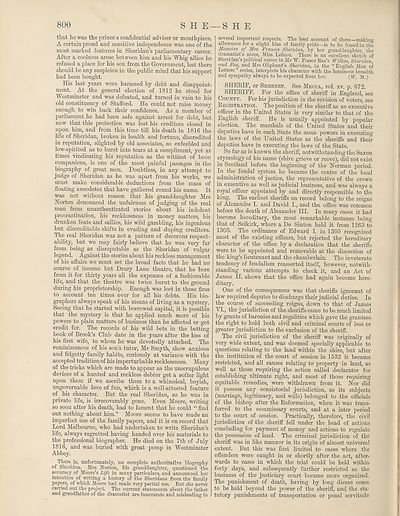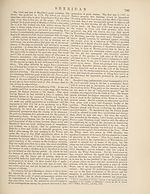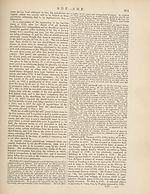Encyclopaedia Britannica > Volume 21, ROT-Siam
(810) Page 800 - SHE
Download files
Complete book:
Individual page:
Thumbnail gallery: Grid view | List view

800
S H E — S H E
that he was the prince's confidential adviser or mouthpiece.
A certain proud and sensitive independence was one of the
most marked features in Sheridan’s parliamentary career.
After a coolness arose between him and his Whig allies he
refused a place for his son from the Government, lest there
should be any suspicion in the public mind that his support
had been bought.
His last years were harassed by debt and disappoint¬
ment. At the general election of 1812 he stood for
Westminster and was defeated, and turned in vain to his
old constituency of Stafford. He could not raise money
enough to win back their confidence. As a member of
parliament he had been safe against arrest for debt, but
now that this protection was lost his creditors closed in
upon him, and from this time till his death in 1816 the
life of Sheridan, broken in health and fortune, discredited
in reputation, slighted by old associates, so enfeebled and
low-spirited as to burst into tears at a compliment, yet at
times vindicating his reputation as the wittiest of boon
companions, is one of the most painful passages in the
biography of great men. Doubtless, in any attempt to
judge of Sheridan as he was apart from his works, we
must make considerable deductions from the mass of
floating anecdotes that have gathered round his name. It
was not without reason that his granddaughter Mrs
Norton denounced the unfairness of judging of the real
man from unauthenticated stories about his indolent
procrastination, his recklessness in money matters, his
drunken feats and sallies, his wild gambling, his ingenious
but discreditable shifts in evading and duping creditors.
The real Sheridan was not a pattern of decorous respect¬
ability, but we may fairly believe that he was very far
from being as disreputable as the Sheridan of vulgar
legend. Against the stories about his reckless management
of his affairs we must set the broad facts that he had no
source of income but Drury Lane theatre, that he bore
from it for thirty years all the expenses of a fashionable
life, and that the theatre was twice burnt to the ground
during his proprietorship. Enough was lost in those fires
to account ten times over for all his debts. His bio¬
graphers always speak of his means of living as a mystery.
Seeing that he started with borrowed capital, it is possible
that the mystery is that he applied much more of his
powers to plain matters of business than he affected or got
credit for. The records of his wild bets in the betting
book of Brook’s Club date in the years after the loss of
his first wife, to whom he was devotedly attached. The
reminiscences of his son’s tutor, Mr Smyth, show anxious
and fidgetty family habits, curiously at variance with the
accepted tradition of his imperturbable recklessness. Many
of the tricks which are made to appear as the unscrupulous
devices of a hunted and reckless debtor get a softer light
upon them if we ascribe them to a whimsical, boyish,
ungovernable love of fun, which is a well-attested feature
of his character. But the real Sheridan, as he was in
private life, is irrecoverably gone. Even Moore, writing
so soon after his death, had to lament that he could “ find
out nothing about him.” Moore seems to have made an
imperfect use of the family papers, and it is on record that
Lord Melbourne, who had undertaken to write Sheridan’s
life, always regretted having handed over his materials to
the professional biographer. He died on the 7th of July
1816, and was buried with great pomp in Westminster
Abbey.
There is, unfortunately, no complete authoritative biography
of Sheridan. Mrs Norton, his granddaughter, questioned the
accuracy of Moore’s Life in many particulars, and announced her
intention of writing a history of the Sheridans from the family
papers, of which Moore had made very partial use. But she never
carried out the project. The current statements about the father
and grandfather of the dramatist are inaccurate and misleading in
several important respects. The best account of them—making
allowance for a slight bias of family pride—is to be found in the
Memoirs of Mrs Frances Sheridan, by her granddaughter, the
dramatist s niece, Miss Lefanu. There is an excellent sketch of
Sheridan’s political career in Mr W. Fraser Kae’s Wilkes, Sheridan
and Fox, and Mrs Oliphant’s Sheridan, in the “English Men of
Letters ” series, interprets his character with the luminous breadth
and sympathy always to be expected from her. (W. M.)
SHERlF, or Shereef. See Mecca, vol. xv. p. 672.
SHERIFF. For the office of sheriff in England, see
County. For his jurisdiction in the revision of voters, see
Registration. The position of the sheriff as an executive
officer in the United States is very similar to that of the
English sheriff. He is usually appointed by popular
election. The marshals of the United States and their
deputies have in each State the same powers in executing
the laws of the Uliited States as the sheriffs and their
deputies have in executing the laws of the State.
So far as is known the sheriff, notwithstanding the Saxon
etymology of his name (shire grieve or reeve), did not exist
in Scotland before the beginning of the Norman period.
In the feudal system he became the centre of the local
administration of justice, the representative of the crown
in executive as well as judicial business, and was always a
royal officer appointed by and directly responsible to the
king. The earliest sheriffs on record belong to the reigns
of Alexander I. and David L, and the office was common
before the death of Alexander III. In many cases it had
become hereditary, the most remarkable instance being
that of Selkirk, where a De Sinton held it from 1265 to
1305. The ordinance of Edward I. in 1305 recognized
most of the existing officers, but rejected the hereditary
character of the office by a declaration that the sheriffs
were to be appointed and removable at the discretion of
the king’s lieutenant and the chamberlain. The inveterate
tendency of feudalism reasserted itself, however, notwith¬
standing various attempts to check it, and an Act of
James II. shows that the office had again become here¬
ditary.
One of the consequences was that sheriffs ignorant of
law required deputes to discharge their judicial duties. In
the course of succeeding reigns, down to that of James
VI., the jurisdiction of the sheriffs came to be much limited
by grants of baronies and regalities which gave the grantees
the right to hold both civil and criminal courts of less or
greater jurisdiction to the exclusion of the sheriff.
The civil jurisdiction of the sheriff was originally of
very wide extent, and was deemed specially applicable to
questions relating to the land within the shire, but after
the institution of the court of session in 1532 it became
restricted, and all causes relating to property in land, as
well as those requiring the action called declarator for
establishing ultimate right, and most of those requiring
equitable remedies, were withdrawn from it. Nor did
it possess any consistorial jurisdiction, as its subjects
(marriage, legitimacy, and wills) belonged to the officials
of the bishop after the Reformation, when it was trans¬
ferred to the commissary courts, and at a later period
to the court of session. Practically, therefore, the civil
jurisdiction of the sheriff fell under the head of actions
concluding for payment of money and actions to regulate
the possession of land. The criminal jurisdiction of the
sheriff was in like manner in its origin of almost universal
extent. But this was first limited to cases where the
offenders were caught in or shortly after the act, after¬
wards to cases in which the trial could be held within
forty days, and subsequently further restricted as the
business of the justiciary court became more organized.
The punishment of death, having by long disuse come
to be held beyond the power of the sheriff, and the sta¬
tutory punishments of transportation or penal servitude
S H E — S H E
that he was the prince's confidential adviser or mouthpiece.
A certain proud and sensitive independence was one of the
most marked features in Sheridan’s parliamentary career.
After a coolness arose between him and his Whig allies he
refused a place for his son from the Government, lest there
should be any suspicion in the public mind that his support
had been bought.
His last years were harassed by debt and disappoint¬
ment. At the general election of 1812 he stood for
Westminster and was defeated, and turned in vain to his
old constituency of Stafford. He could not raise money
enough to win back their confidence. As a member of
parliament he had been safe against arrest for debt, but
now that this protection was lost his creditors closed in
upon him, and from this time till his death in 1816 the
life of Sheridan, broken in health and fortune, discredited
in reputation, slighted by old associates, so enfeebled and
low-spirited as to burst into tears at a compliment, yet at
times vindicating his reputation as the wittiest of boon
companions, is one of the most painful passages in the
biography of great men. Doubtless, in any attempt to
judge of Sheridan as he was apart from his works, we
must make considerable deductions from the mass of
floating anecdotes that have gathered round his name. It
was not without reason that his granddaughter Mrs
Norton denounced the unfairness of judging of the real
man from unauthenticated stories about his indolent
procrastination, his recklessness in money matters, his
drunken feats and sallies, his wild gambling, his ingenious
but discreditable shifts in evading and duping creditors.
The real Sheridan was not a pattern of decorous respect¬
ability, but we may fairly believe that he was very far
from being as disreputable as the Sheridan of vulgar
legend. Against the stories about his reckless management
of his affairs we must set the broad facts that he had no
source of income but Drury Lane theatre, that he bore
from it for thirty years all the expenses of a fashionable
life, and that the theatre was twice burnt to the ground
during his proprietorship. Enough was lost in those fires
to account ten times over for all his debts. His bio¬
graphers always speak of his means of living as a mystery.
Seeing that he started with borrowed capital, it is possible
that the mystery is that he applied much more of his
powers to plain matters of business than he affected or got
credit for. The records of his wild bets in the betting
book of Brook’s Club date in the years after the loss of
his first wife, to whom he was devotedly attached. The
reminiscences of his son’s tutor, Mr Smyth, show anxious
and fidgetty family habits, curiously at variance with the
accepted tradition of his imperturbable recklessness. Many
of the tricks which are made to appear as the unscrupulous
devices of a hunted and reckless debtor get a softer light
upon them if we ascribe them to a whimsical, boyish,
ungovernable love of fun, which is a well-attested feature
of his character. But the real Sheridan, as he was in
private life, is irrecoverably gone. Even Moore, writing
so soon after his death, had to lament that he could “ find
out nothing about him.” Moore seems to have made an
imperfect use of the family papers, and it is on record that
Lord Melbourne, who had undertaken to write Sheridan’s
life, always regretted having handed over his materials to
the professional biographer. He died on the 7th of July
1816, and was buried with great pomp in Westminster
Abbey.
There is, unfortunately, no complete authoritative biography
of Sheridan. Mrs Norton, his granddaughter, questioned the
accuracy of Moore’s Life in many particulars, and announced her
intention of writing a history of the Sheridans from the family
papers, of which Moore had made very partial use. But she never
carried out the project. The current statements about the father
and grandfather of the dramatist are inaccurate and misleading in
several important respects. The best account of them—making
allowance for a slight bias of family pride—is to be found in the
Memoirs of Mrs Frances Sheridan, by her granddaughter, the
dramatist s niece, Miss Lefanu. There is an excellent sketch of
Sheridan’s political career in Mr W. Fraser Kae’s Wilkes, Sheridan
and Fox, and Mrs Oliphant’s Sheridan, in the “English Men of
Letters ” series, interprets his character with the luminous breadth
and sympathy always to be expected from her. (W. M.)
SHERlF, or Shereef. See Mecca, vol. xv. p. 672.
SHERIFF. For the office of sheriff in England, see
County. For his jurisdiction in the revision of voters, see
Registration. The position of the sheriff as an executive
officer in the United States is very similar to that of the
English sheriff. He is usually appointed by popular
election. The marshals of the United States and their
deputies have in each State the same powers in executing
the laws of the Uliited States as the sheriffs and their
deputies have in executing the laws of the State.
So far as is known the sheriff, notwithstanding the Saxon
etymology of his name (shire grieve or reeve), did not exist
in Scotland before the beginning of the Norman period.
In the feudal system he became the centre of the local
administration of justice, the representative of the crown
in executive as well as judicial business, and was always a
royal officer appointed by and directly responsible to the
king. The earliest sheriffs on record belong to the reigns
of Alexander I. and David L, and the office was common
before the death of Alexander III. In many cases it had
become hereditary, the most remarkable instance being
that of Selkirk, where a De Sinton held it from 1265 to
1305. The ordinance of Edward I. in 1305 recognized
most of the existing officers, but rejected the hereditary
character of the office by a declaration that the sheriffs
were to be appointed and removable at the discretion of
the king’s lieutenant and the chamberlain. The inveterate
tendency of feudalism reasserted itself, however, notwith¬
standing various attempts to check it, and an Act of
James II. shows that the office had again become here¬
ditary.
One of the consequences was that sheriffs ignorant of
law required deputes to discharge their judicial duties. In
the course of succeeding reigns, down to that of James
VI., the jurisdiction of the sheriffs came to be much limited
by grants of baronies and regalities which gave the grantees
the right to hold both civil and criminal courts of less or
greater jurisdiction to the exclusion of the sheriff.
The civil jurisdiction of the sheriff was originally of
very wide extent, and was deemed specially applicable to
questions relating to the land within the shire, but after
the institution of the court of session in 1532 it became
restricted, and all causes relating to property in land, as
well as those requiring the action called declarator for
establishing ultimate right, and most of those requiring
equitable remedies, were withdrawn from it. Nor did
it possess any consistorial jurisdiction, as its subjects
(marriage, legitimacy, and wills) belonged to the officials
of the bishop after the Reformation, when it was trans¬
ferred to the commissary courts, and at a later period
to the court of session. Practically, therefore, the civil
jurisdiction of the sheriff fell under the head of actions
concluding for payment of money and actions to regulate
the possession of land. The criminal jurisdiction of the
sheriff was in like manner in its origin of almost universal
extent. But this was first limited to cases where the
offenders were caught in or shortly after the act, after¬
wards to cases in which the trial could be held within
forty days, and subsequently further restricted as the
business of the justiciary court became more organized.
The punishment of death, having by long disuse come
to be held beyond the power of the sheriff, and the sta¬
tutory punishments of transportation or penal servitude
Set display mode to:
![]() Universal Viewer |
Universal Viewer | ![]() Mirador |
Large image | Transcription
Mirador |
Large image | Transcription
Images and transcriptions on this page, including medium image downloads, may be used under the Creative Commons Attribution 4.0 International Licence unless otherwise stated. ![]()
| Encyclopaedia Britannica > Encyclopaedia Britannica > Volume 21, ROT-Siam > (810) Page 800 - SHE |
|---|
| Permanent URL | https://digital.nls.uk/193637809 |
|---|
| Attribution and copyright: |
|
|---|---|
| Shelfmark | EB.17 |
|---|---|
| Description | Ten editions of 'Encyclopaedia Britannica', issued from 1768-1903, in 231 volumes. Originally issued in 100 weekly parts (3 volumes) between 1768 and 1771 by publishers: Colin Macfarquhar and Andrew Bell (Edinburgh); editor: William Smellie: engraver: Andrew Bell. Expanded editions in the 19th century featured more volumes and contributions from leading experts in their fields. Managed and published in Edinburgh up to the 9th edition (25 volumes, from 1875-1889); the 10th edition (1902-1903) re-issued the 9th edition, with 11 supplementary volumes. |
|---|---|
| Additional NLS resources: |
|

